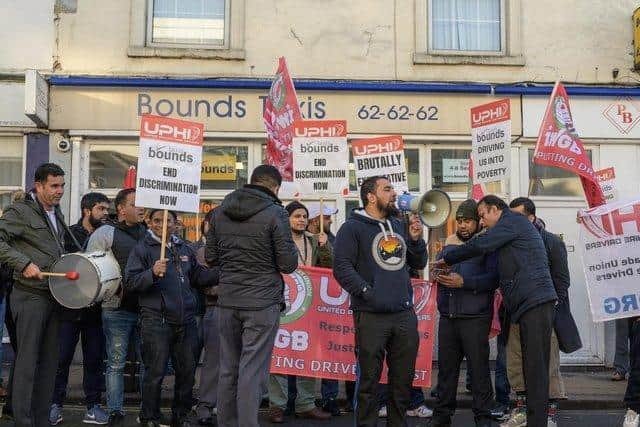Taxi drivers win legal battle against Northampton firm to ensure cabbies get workers' rights
and live on Freeview channel 276
Two taxi drivers have won a legal battle against their former Northampton employer to ensure cabbies receive the appropriate rights as workers.
An employment tribunal ruled Bounds Taxis' private hire drivers should be classed as 'workers' in a case brought by Shafqat Shah and Samuel Adjei and backed by the App Drivers and Couriers Union (ACDU).
Advertisement
Hide AdAdvertisement
Hide AdIn a ruling last month, Employment Judge Postle said the firm's drivers are ‘workers without doubt’ while criticising its practices and evidence during the four-day hearing in April.


United Travel Group, which owns Bounds, said the firm now 'affords all drivers absolute freedom to operate as a self-employed private hire driver'.
Mr Shah, who is also the ADCU Northampton chairman, said: “I am so pleased and relieved that Bounds drivers are now finally recognized as the workers we always were.
"The era of brutal exploitation in the local minicab trade must come to an end."
Advertisement
Hide AdAdvertisement
Hide AdBounds has for years operated a business model which insists that drivers are self-employed yet drivers were subject to intense micro management and a harsh disciplinary process, according to the ACDU.
The union added drivers were required to wear a Bounds uniform under threat of suspension if they did not do so while they were penalised if they missed or refused a job dispatched by app.
Mr Shah and Mr Adjei sued Bounds as they claimed they were entitled to a guaranteed minimum wage, holiday pay, pension contributions, and collective bargaining rights, among others as 'self-employed workers'.
The pair, who have not worked for Bounds since April, 2020, say cabbies worked, on-average, 12-hour days seven-days-a-week to earn a minimum wage, as well as having to pay £175-per-week 'radio rent' fees to even work for the firm, plus £30-a-day for fuel and insurance.
Advertisement
Hide AdAdvertisement
Hide AdUnited Travel Group added the tribunal claim was first brought several years ago and has been delayed due to the coronavirus pandemic and legal arguments but Bounds now 'functions in a completely different manner'.
Huntingdon County Court in Cambridgeshire heard Mr Shah and Mr Adjei's case against Bounds on April 26-29 and sent its ruling to those involved on September 20.
The judge noted in his ruling, seen by the Chronicle & Echo: "It is clear from the factual basis that each driver had no choice, that was imposed upon them by the respondents no doubt to avoid any potential employer-employee obligations."
Bounds required their driver workforce to pay the company £9,000 in ‘rent’ with no guarantees about how much work, if any, they might receive.
Advertisement
Hide AdAdvertisement
Hide AdThe judge found that ‘rent’ was collected weekly and if drivers were late with payment they were ‘fined’ £10 per day by management.
In a withering assessment of the evidence presented by Bounds, the judge remarked: "Their evidence was largely unhelpful, disingenuous and evasive on occasions."
ADCU president Yaseen Aslam said: “This case once again proves that the problem of worker abuse in the private hire sector is widespread and deeply rooted in an industry that employs more than 250,000 people nation-wide.
"The ADCU will not hesitate to protect our members wherever they may be and there will be plenty more similar cases to come.
Advertisement
Hide AdAdvertisement
Hide Ad"If the government will not enforce the law to protect the most vulnerable workers in this trade, then we will.”
Around 40 drivers protested outside Bounds' office in Bradshaw Street in December, 2019, calling for a £5 minimum fare on jobs, a freeze on hiring more drivers and for the company to instead collect fees on a 15 per cent commission basis instead of a flat fee for drivers.
United Travel Group's statement said: "The tribunal claim was brought several years ago, but due to the pandemic and our legal representatives questioning the legitimacy of the claim, due to concerns about the claimants tax returns that we insisted were disclosed, the final hearing was delayed.
"The legal framework for determining if an individual is a worker is complex and by no means a simple binary response on any one fact.
Advertisement
Hide AdAdvertisement
Hide Ad"Consequently, United Travel Group now functions in a completely different manner, which affords all drivers absolute freedom to operate as a self-employed private hire driver.
"It should be noted that the claimants no longer have any connections with our business and have not done so since April 2020."